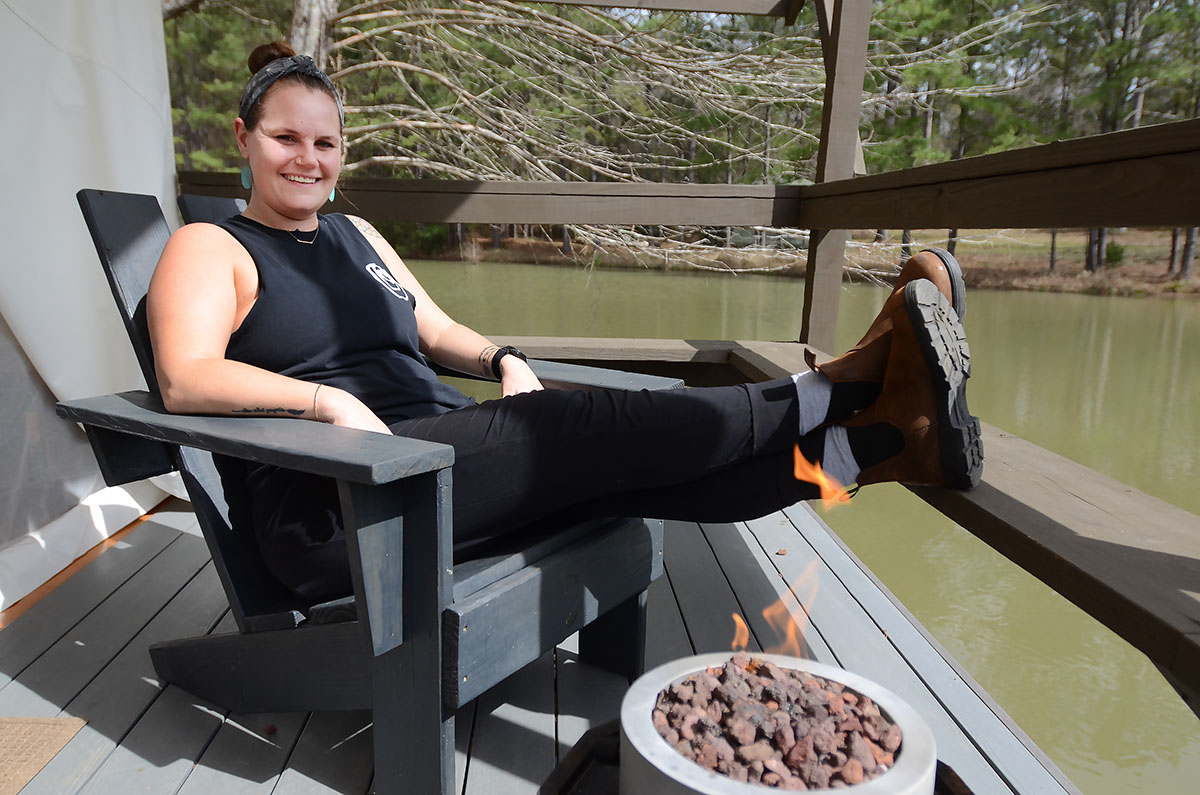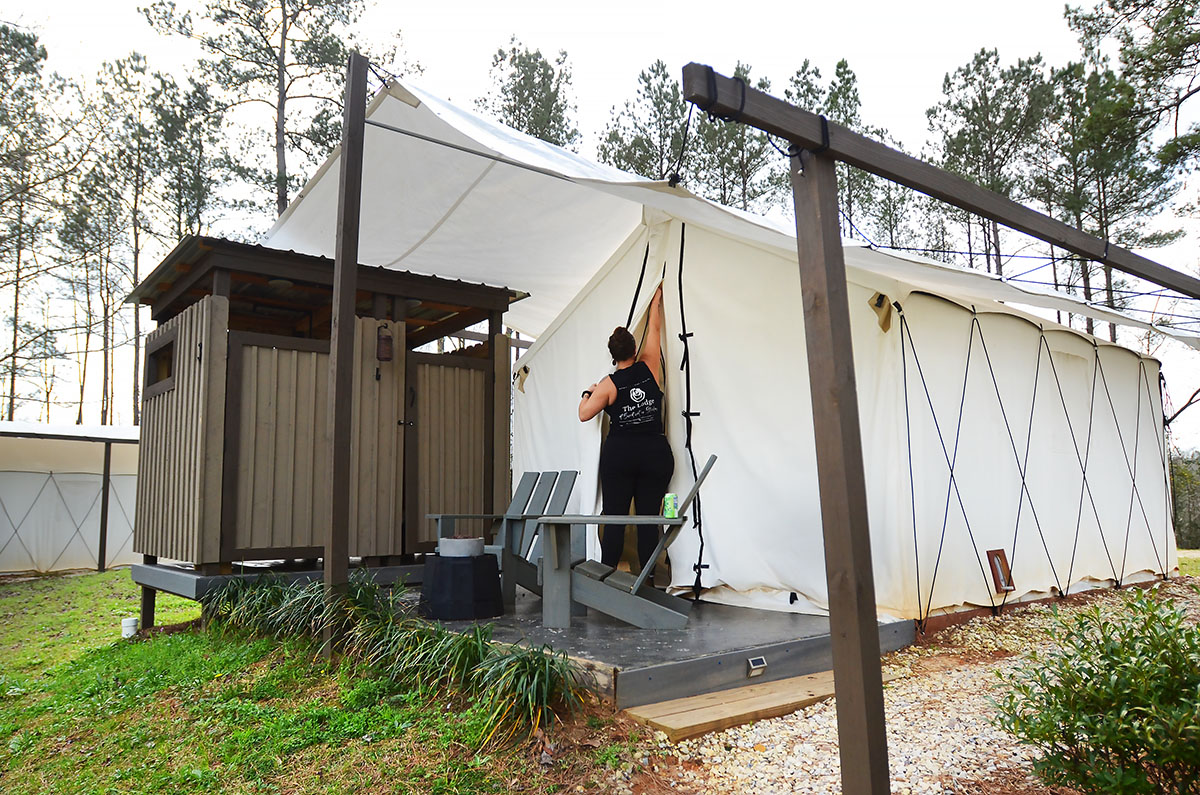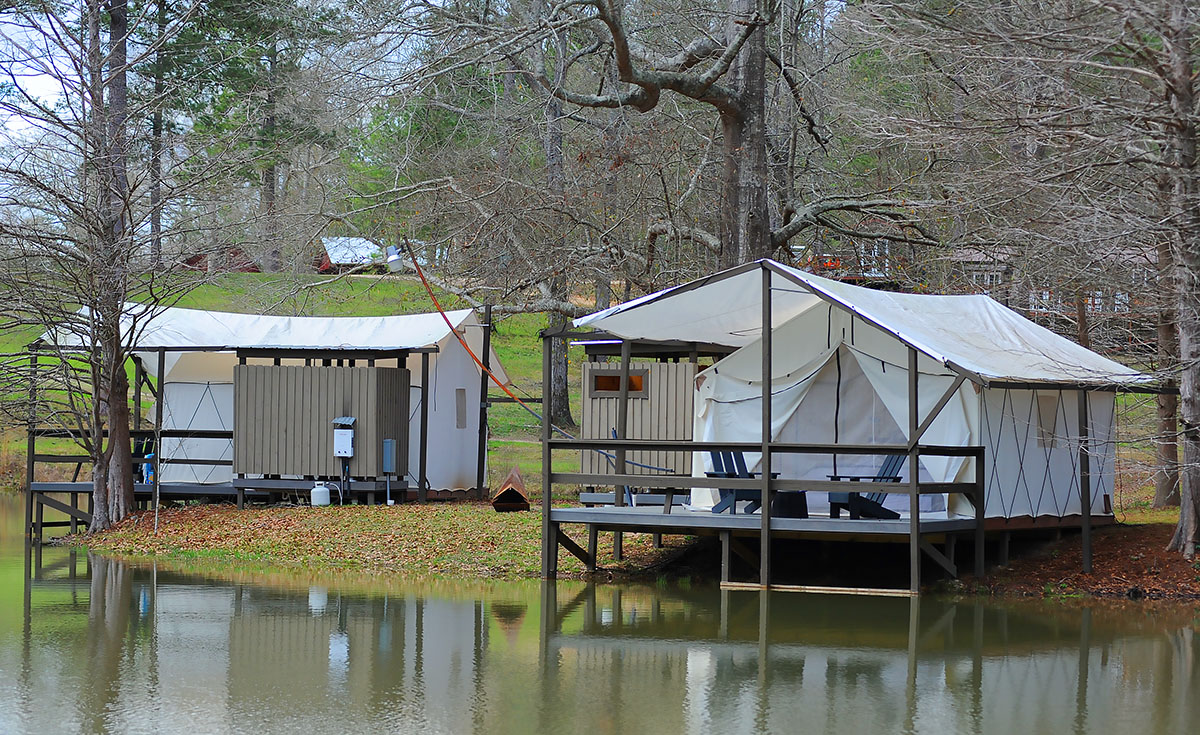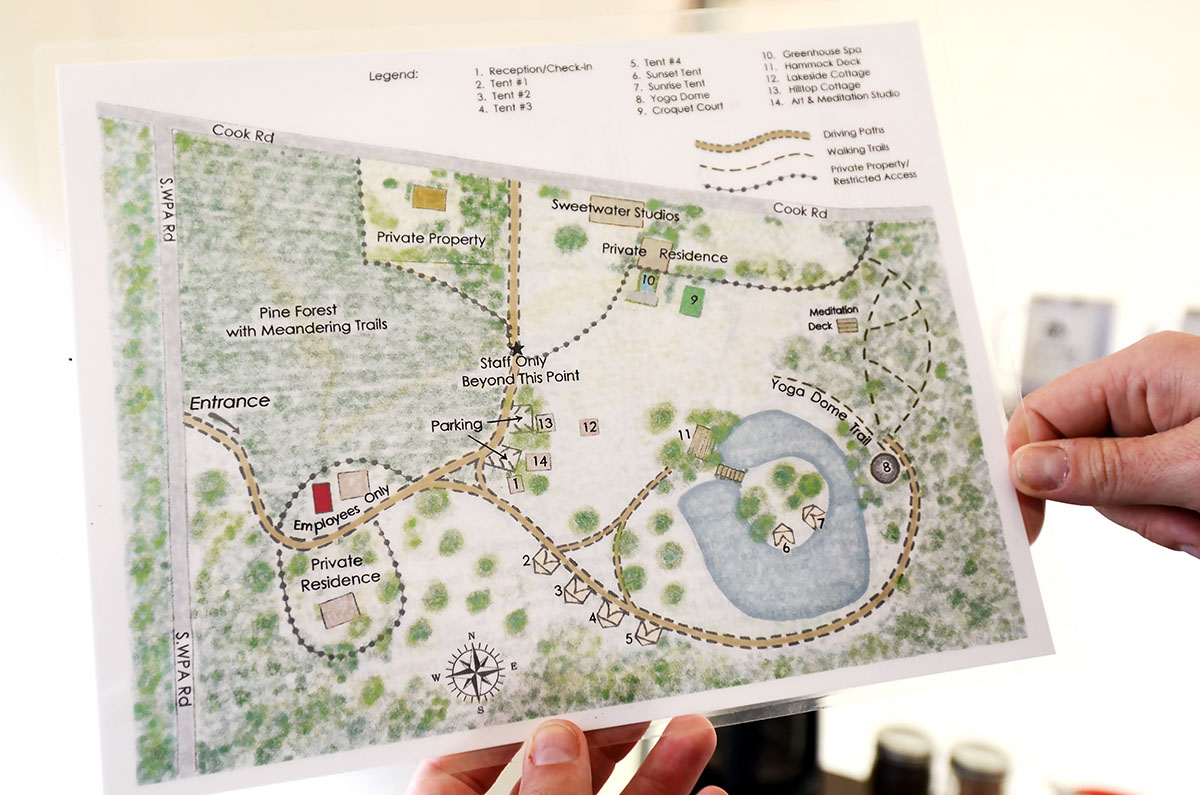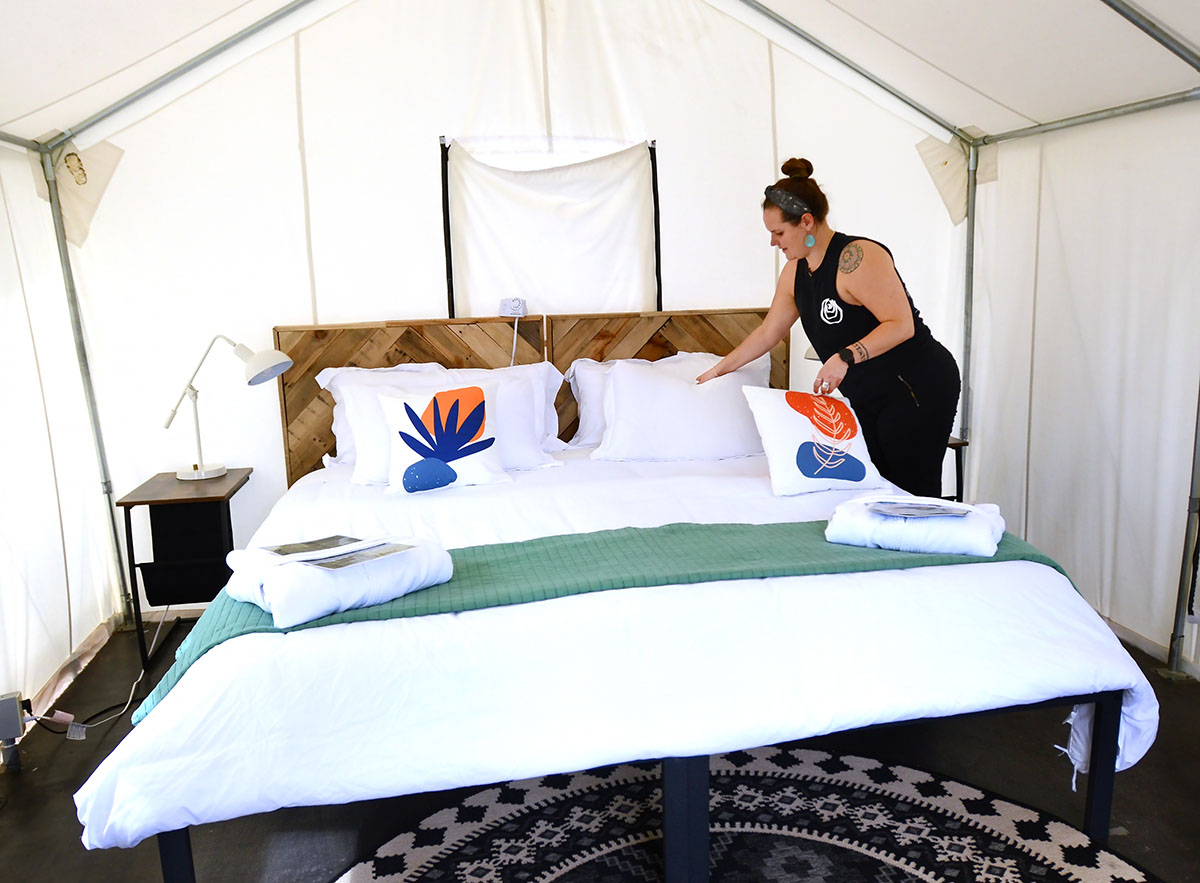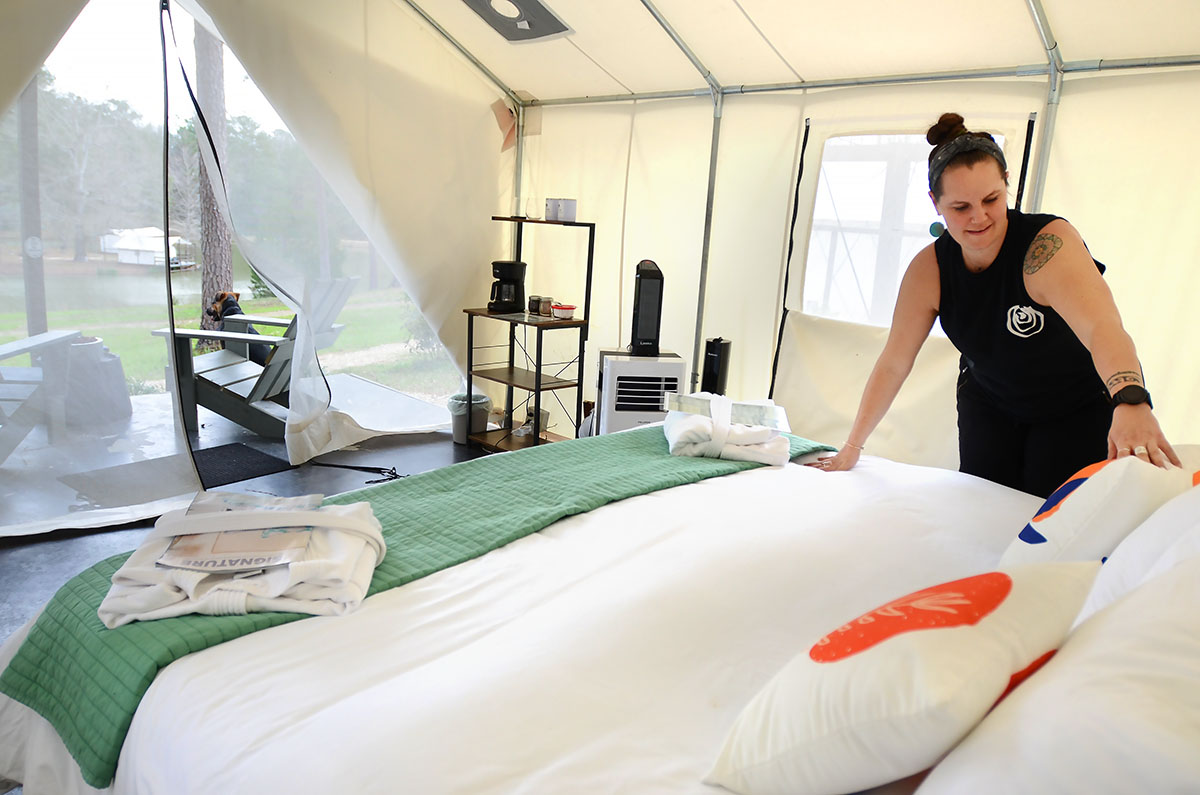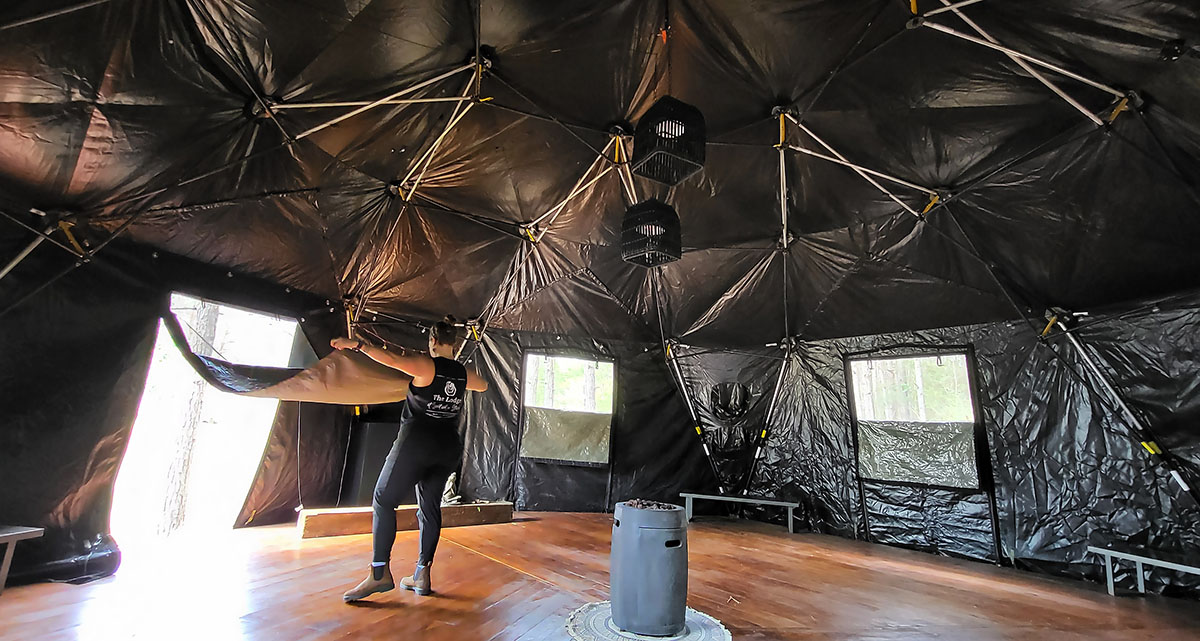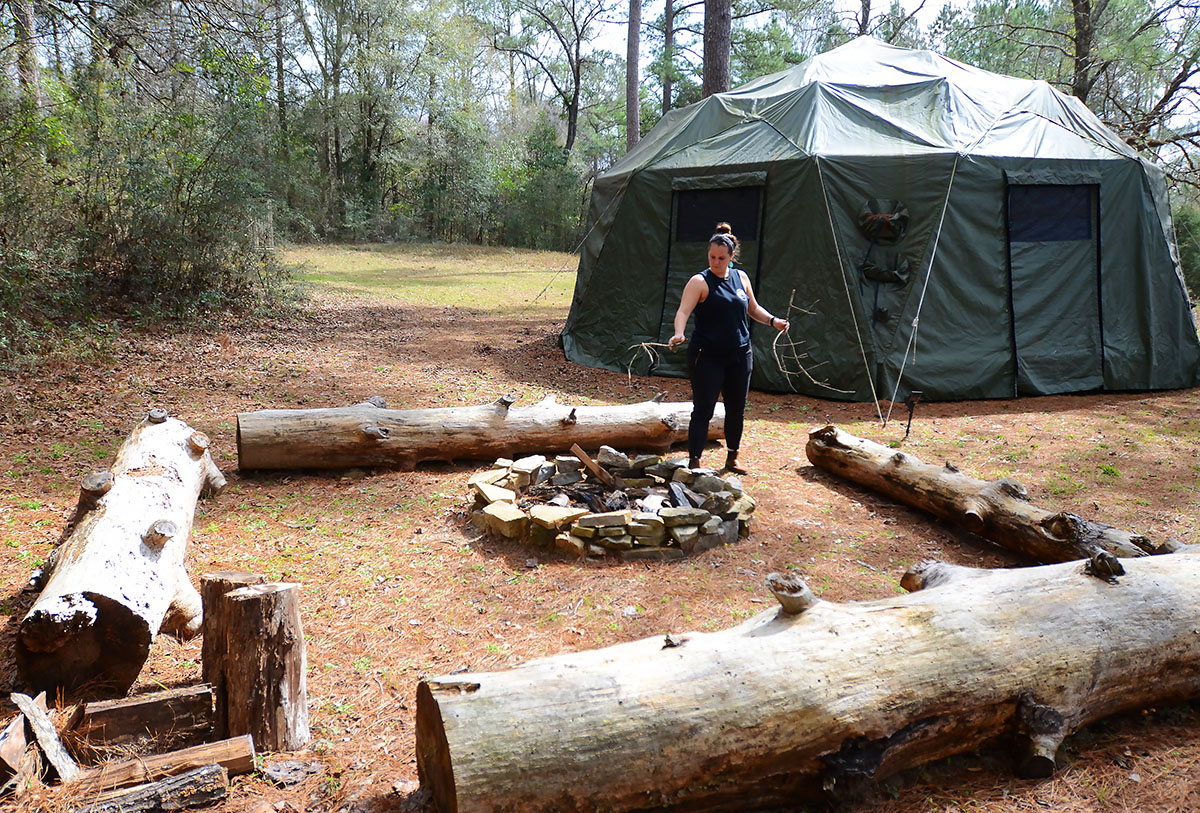Mississippi Today
Photo essay: The Lodge at Stillwater Studios

Photo essay: The Lodge at Stillwater Studios
Y'all remember the old 1970s Three Dog Night hit, “Out in the Country”? No?
Find it and give it a listen.
The song is a whimsical homage to needing space when life starts closing in. Sometimes you just need to get away. Take the road less traveled. All roads lead to somewhere. That kind of thing.
And the place to do that is The Lodge in Moselle, a get-away with safari-like tents and cottages equipped with all the comforts of home.
With theme music firmly in your head, pack a few essentials, get in your vehicle and, if leaving the Jackson metro area, hit U.S. 49 South. Keep going until you get to Collins and hook a left on Mississippi 588.
Keep going.
Enjoy the pastoral beauty of the boonies. Moo at cows and grin at your own silliness. Breathe.
Mississippi 588 becomes Moselle-Seminary Road, which becomes Mississippi 11 South. You'll take a few more rights and a handful of lefts on a two-lane blacktop, but keep going. Trust your GPS. You lose cellphone service, but so what, that's kind of the point.
That last turn really does put you on S w P A Road in Moselle.
You have arrived.
There's a cute little signpost welcoming you to The Lodge at Sweetwater Studios.
Owner and operator Airon Whitt will motor out on her golf cart to greet you. It's quite possible her two dogsDiego and Dora will greet you, too. They're good ambassadors for where you'll be kicking back. Both were strays and decided to stay. Don't be surprised if the same ideas whisper to you.
Once you've stretched your legs and loosen up from the drive, have a listen.
Do you hear it?
That's right. No traffic. No cellphones or televisions.
Take a deep, deep breath. Soak in the peacefulness of rustic overload — birds chirping, tree leaves rustling from a soft breeze wafting through the surrounding woods of the 26-acre property.
You'll notice Airon waiting patiently while you soak it all in, smiling at you and the “knowing” you've just acquired.
“My parents are artists who traveled, honed their crafts and helped out in the communities where we lived when I was a kid. I can remember us staying in these huge tents that I thought were so cool. I told myself, I'll have tents just like that one day. That's the beauty of the internet. I found the exact same tents and here they are,” Whitt said, as she tidied up the sleeping area in one of the tents.
“I worked in the tourism and travel industry, in hotels and restaurants for over 15 years. I learned so much, and I discovered just how much I loved it,” Whitt said, as she vented the huge 31-foot, domed yoga tent. “That planted a few seeds, you know. I knew I wanted to live my dream of owning my own get-a-way space, hotel, something like that someday.”
“I had one of the best jobs ever… spending summers traveling the world with teenagers to places like Panama, Guatemala, Thailand, Ghana, Cambodia and Morocco. Then COVID hit.I found myself wondering just what I was going to do. It forced me to move back here. But out of that nightmare, my dream took shape. The Lodge at Sweetwater Studios was born,” Whitt said with admiration.
Yes, for the glammer-camper in you, there are private bathrooms, hot water, rainfall showers and heated blankets. Other amenities include bathrobes, beds with memory foam mattresses, heat, air conditioning, coffee makers and wine glasses. Contemplate life out on the deck and enjoy the firepit, sunrises or sunsets, your choice.
There's a 3-acre lake and pedal boats. Work out your kinks in the 31-foot yoga tent. An art studio is available for instructor workshops. Birdwatch while hiking the nature trails in the surrounding woods.
Whitt's father built a 5,250-foot croquet lawn, as well as a greenhouse filled with tropical plants, many grown from Airon's unique finds from the places she visited. There's also an 8-foot deep pool, a spa and sauna.
Whitt invites one and all to come as a group or come alone to take a load off. Relax, meditate, explore… oh, and play croquet.
Help us feature businesses in Mississippi owned by women:
(function (c, i, t, y, z, e, n, x) { x = c.createElement(y), n = c.getElementsByTagName(y)[0]; x.async = 1; x.src = t; n.parentNode.insertBefore(x, n); })(document, window, “//publicinput.com/Link?embedId=17671”, “script”);
View photo galleries of businesses owned by women and people of color.
This article first appeared on Mississippi Today and is republished here under a Creative Commons license.
Did you miss our previous article…
https://www.biloxinewsevents.com/on-this-day-in-1974/
Mississippi Today
On this day in 1937


May 1, 1937

Jackie Ormes became the first known Black cartoonist whose work was read coast to coast through the major black publication, the Pittsburgh Courier.
Her cartoon told the story of Torchy Brown, a Mississippi teenager who sang and danced her way from Mississippi to New York City, mirroring the Great Migration, when millions of African Americans trekked from the South to the North, Midwest and West.
In 1945, her cartoon, “Patty-Jo ‘n' Ginger,” started. The strip proved so popular that department stores sold Patty-Jo as a doll. Five years later, Torchy returned, this time as a confident and courageous woman who dared to tackle such issues as race, sex and the environment. Readers applauded this strong model of what young Black women could be.
In 2014, she was inducted into the Black Journalists Hall of Fame and was later featured by Google on its search page.
This article first appeared on Mississippi Today and is republished here under a Creative Commons license.
Did you miss our previous article…
https://www.biloxinewsevents.com/?p=354343
Mississippi Today
Work requirement will likely delay or invalidate Medicaid expansion in Mississippi
The final version of Medicaid expansion in the Legislature could leave tens of thousands of uninsured, working Mississippians waiting indefinitely for Medicaid coverage – unless the federal government makes an unprecedented move.
The compromise lawmakers reached minutes before a legislative deadline on Monday night makes expansion contingent on a work requirement. That means even if both chambers pass the bill, the estimated 200,000 Mississippians who would qualify for coverage would need to wait until the federal government, under either a Biden or Trump administration, approved the waiver necessary to implement a work requirement – which could take years, if ever.
Lawmakers in favor of the work requirement have not been open to allowing expansion to move forward while the work requirement is in flux. The House bill proposed expansion be implemented immediately but included a “trigger law” similar to North Carolina's. The “trigger law” mandated that if the federal government ever changed its policy on allowing states to implement a work requirement, Mississippi would move to implement one immediately.
Senator Brice Wiggins, R-Pascagoula, one of the Medicaid expansion conferees, posted on social media “if CMMS wants people covered then it will approve (the work requirement). Nothing prevents them from approving it other than POTUS/CMMS philosophy.”
But even in states where a work requirement was approved, litigation ensued, with the courts finding the approval of the work requirement unlawful for a number of reasons, according to a KFF report.
Senate Medicaid Chairman Kevin Blackwell, R-Southaven, did not respond to Mississippi Today by the time the story published.
Will a Biden – or Trump – administration approve the work requirement?
The Biden administration has never approved the waiver necessary for a work requirement and has rescinded ones previously granted under the Trump administration. Waivers granted under the Trump administration were not granted under the current circumstances as Mississippi.
Mississippi Today reached out to the Centers for Medicare and Medicaid Services for comment but did not hear back by the time of publication.
Joan Alker, Medicaid expert and executive director of Georgetown University's Center for Children and Families, explained that the Trump administration has never approved a work requirement up front for a traditional expansion plan like Mississippi's.
In states like Kentucky and Arkansas, Alker explained, the Trump administration approved work requirements as a means of limiting already-existing expansion plans. In Georgia, an outlier state that remains in litigation with the Biden administration for rescinding the state's work requirement waiver, the Trump administration approved a work requirement for a plan that isn't considered full “expansion” under the Affordable Care Act and doesn't draw down the increased federal match rate.
“If the Legislature passed a bill with both of those requirements being non-negotiable, (the work requirement and the enhanced match) they need to know that there is no precedent for that kind of approval from either a Biden or a Trump CMS,” she said.
What happens if a work requirement is approved?
In the best case scenario – that a work requirement is approved by some administration in the near future – its implementation could mean an increase in administrative costs and a decrease in eligible enrollees getting the coverage for which they qualify. Georgia's plan, for example, requires people document they're in school, working or participating in other activities. The requirement has cost taxpayers at least $26 million, and more than 90% of that has gone toward administrative and consulting costs, according to KFF Health News.
“Even if CMS does approve (it), actually implementing and administering work requirements is costly and complex,” explained Morgan Henderson, the principal data scientist on a study commissioned by the Center for Mississippi Health Policy and conducted by the Hilltop Institute at the University of Maryland, Baltimore County. “This would almost certainly significantly dampen enrollment relative to a scenario with no work requirements, and cost the state millions to implement.”
Many of the cases where work requirements were approved but then deemed unlawful were due to court rulings that found that the work requirement resulted in lower enrollment, counterproductive to the primary goal of Medicaid.
In addition to lowering enrollment, the work requirements have not led to increased employment, the primary goal of the work requirement, explained Alice Middleton, deputy director of the Hilltop Institute and a former deputy director of the Division of Eligibility and Enrollment at the Centers for Medicare and Medicaid Services.
“Recent guidance has been clear that work requirements would jeopardize health coverage and access without increasing employment,” Middleton said. “While a future Trump Administration may revisit these decisions and approve work requirements again, legal challenges are likely to follow …”
Senate leaders compromised with the House on a number of fine points regarding the work requirement: reducing the mandatory employment from 120 to 100 hours a month; reducing the number of employment verification renewals from four times to once a year; and removing the clause that would require the state to enter into litigation with the federal government, as Georgia did, if the federal government turns down the work requirement.
“It was encouraging to see both sides compromising, but, ultimately, the inclusion of work requirements presents multiple sets of challenges to successful expansion,” Henderson said.
This article first appeared on Mississippi Today and is republished here under a Creative Commons license.
Mississippi Today
Why many House Democrats say they’ll vote against a bill that is ‘Medicaid expansion in name only’
For a decade, House Democrats have been beating the drum — often when it seemed no one else was listening — to expand Medicaid to provide health care for working poor Mississippians.
It looks as though a large majority of those House Democrats as early as Wednesday will vote against and possibly kill a bill that purports to expand Medicaid.
They say the agreement reached late Monday between House and Senate Republicans may be called Medicaid expansion, but it is not written to actually go into effect or help the hundreds of thousands of Mississippians who need health care coverage.
“It is just like an eggshell with no egg in the middle,” said Rep. Timaka James-Jones, a Democratic from Belzoni in her first term. “It does not make sense.”
Republicans, who have have supermajorities in both the House and Senate and do not need a single Democratic vote to pass any bill, have for years relished their power over legislative Democrats. But when a three-fifths vote is needed and Republicans aren't in unanimous agreement like on this current bill, Democrats have real power to flex.
Earlier on Tuesday, after a closed-door luncheon meeting of House Democrats, Rep. Robert Johnson of Natchez, the minority leader, informed Speaker Jason White that 32 of the 41 House Democrats planned to vote no. That news sent shockwaves through the Capitol.
With several House Republicans also expected to vote no, that number of dissenting Democrats would likely prevent the legislation from getting the three-fifths majority needed to pass. And no votes by 32 Democrats would surely mean the proposal would fall short of the two-thirds majority that would be needed later to override an expected veto from Gov. Tate Reeves, who is opposed to accepting more than a $1 billion a year in federal funds to provide health care for an estimated 200,000 Mississippians.
At issue for the House Democrats is a work requirement that Senate Republicans insisted be placed in the bill and that House negotiators agreed to minutes before the Monday night deadline to reach an agreement between the two chambers.
Federal officials have made it clear in the past that they would not approve a work requirement as part of Medicaid expansion. But in the proposal that House and Senate leaders agreed to, Medicaid expansion would not go into effect until federal officials approve a work requirement.
Senate leaders have expressed optimism that the Biden administration would be so pleased with longtime Medicaid expansion holdout Mississippi making an effort that it would approve a work requirement, or that the conservative federal 5th Circuit Court would approve it if litigated.
“It is tough. For the 11 years I have served in the House, I have supported the state expanding Medicaid,” said Rep. John Faulkner, D-Holly Springs. “But the truth is this conference report really doesn't do anything to help poor people who need it.”
The comments made by Faulkner were echoed by multiple House Democrats at the luncheon meeting, according to numerous sources inside the meeting.
After that meeting, Democratic leader Johnson relayed those sentiments and the Democrats' plans to vote against the proposal to White.
So White called a Tuesday afternoon meeting with Johnson. After the Republican speaker and Democratic leader met behind closed doors, Johnson announced on the House floor that House Democrats would hold another caucus meeting. It did not last long.
After that meeting, several Democrats said their plans to vote against the bill had not changed, though some acknowledged privately that voting against the bill would be difficult. One member, when asked if the Democrats still planned to vote against the proposal in large numbers, replied, “It is fluid. I don't know. We will see.”
Many of the Democrats praised White, a first-term speaker, for finally tackling Medicaid expansion. And they praised the original House bill that that allowed Medicaid expansion to go into effect in Mississippi like it had in 40 other states even if a work requirement was struck down by federal officials. They also praised Republican Medicaid Chairwoman Missy McGee for her work to pass “a clean” Medicaid expansion bill.
READ MORE: House agrees to work requirement, Senate concedes covering more people in Medicaid expansion deal
But they expressed disappointment with the final agreement worked out between House and Senate leaders with the non-negotiable work requirement. They said they had informed House leaders all along that they would oppose a compromise that included a work requirement.
“We know all eyes are on us right now because the Republican supermajority couldn't reach an agreement among themselves,” said Rep. Daryl Porter, D-Summit. “Republican infighting on Medicaid expansion becoming our responsibility to referee feels unfair when they're the ones who couldn't get the support for their own bill. They're waiting to see if we'll bail them out.”
Several House Democrats said it would be difficult to go back home and explain to their constituents that they voted against Medicaid expansion.
But Rep. Rickey Thompson, D-Tupelo, said people should not view them as voting against Medicaid expansion simply because the bill would not expand Medicaid.
“It just puts something on paper, but it does not do anything,” said Thompson.
“It is not Medicaid expansion,” said Zakiya Summers, D-Jackson, who said she campaigned on Medicaid expansion when she first ran and was first elected in 2019. She spoke as a surrogate for Democratic gubernatorial candidate Brandon Presley last year in support of Medicaid expansion.
Rep. Bryant Clark, D-Pickens, said it would be more difficult to explain to constituents that they could not get health care through Medicaid even after the Legislature approved it than to vote against it and explain the reason for that vote.
Numerous members said Rep. Percy Watson, D-Hattiesburg, made the most salient point at the Democrats' first caucus meeting on Tuesday.
Watson, the longest serving member of the House, told the story of a vote in the 1982 session on a bill that would have allowed local school districts to enact kindergarten and require mandatory school attendance. Watson said he voted for the bill, but later was pleased that it died.
If that bill had passed, there would not have been the landmark special session later that year when statewide kindergarten was created and school attendance was mandated statewide.
“Sometimes it takes more than one session to pass something important,” Watson said.
Everyone at the Capitol is closely tracking what the House Democrats decide — including Senate Republicans, who are reportedly struggling to get a three-fifths vote of their own to pass the bill in that chamber.
After word spread Tuesday of the House Democrats' meeting and potential killing of the expansion bill, Senate Medicaid Chair Kevin Blackwell, R-Southaven, said he would not present the expansion proposal in his chamber until after the House acted.
The bill, which faces a Thursday evening deadline, could be sent back for additional negotiations where the work requirement could be removed. But the Senate has thus far not yielded on the work requirement — something that House Democrats, clearly, believe would result in the bill never going into effect.
READ MORE: Back-and-forth: House, Senate swap Medicaid expansion proposals, counter offers
This article first appeared on Mississippi Today and is republished here under a Creative Commons license.
-
Local News7 days ago
Sister of Mississippi man who died after police pulled him from car rejects lawsuit settlement
-
Mississippi Today7 days ago
At Lake High School in Scott County, the Un-Team will never be forgotten
-
Mississippi Today4 days ago
On this day in 1951
-
Mississippi News5 days ago
One injured in Mississippi officer-involved shooting after chase
-
SuperTalk FM3 days ago
Festival merger in Leland sets up one major event for Mississippi Delta
-
Mississippi News2 days ago
Two women accused of shoplifting across southeast captured in Mississippi
-
SuperTalk FM3 days ago
PERS bill set to phase in employer rate increase heads to governor’s desk
-
Mississippi News7 days ago
Ridgeland man sentenced for molesting girl


